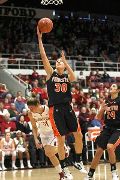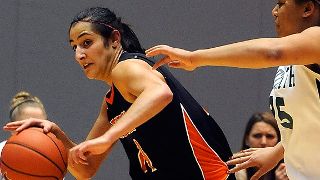PRINCETON, N.J. -- Building a women's basketball program in the Ivy League that is capable of competing on a national level isn't easy. Neither, by the sound of things, is a branch of economics dealing with statistical methods used to study
well, let's just say numbers. Not all of us went to Princeton.
But the intersection of those two truths arrives when you hear just how excited Princeton senior Lauren Edwards gets in talking about the toughest class of her four years at the alma mater of Woodrow Wilson, Bill Bradley and so many other notable figures. Edwards is a grinner by nature, a self-professed loudmouth, but after talking for several minutes about basketball in nothing more than conversational third gear, she shifts into fifth gear when it comes to classes.
"Econometrics was probably my hardest class," Edwards gushed in much the way others might debate the merits of television shows. "But it also was one of my favorites because it was very applicable to my thesis. We have a lot of independent work here, so as an econ major, you have to use those type of regressions and whatever."
Whatever, indeed. Sitting next to her teammate with something perhaps best categorized as a look of amused mortification spreading across her face, Ivy League Player of the Year Niveen Rasheed pleaded sotto voce, "Stop talking."
Believe it or not, this is how you build a program that believes it can win a game in the NCAA tournament for the first time when the No. 9 Tigers face No. 8 seed Kansas State in the first round. And it's how you build a team that believes that if it's fortunate enough to then earn a shot at top seed Connecticut in the second round, anything is possible.
Princeton men's basketball, a national power when Bradley was around, regained a measure of notoriety in recent decades for its old-school system that routinely scared and occasionally beat powers like Georgetown and UCLA in the NCAA tournament. At least from afar, it appeared Pete Carril and the coaches who followed in his footsteps simply plugged in new pieces to run the same backdoor cuts and possession game generation after generation. It was a brilliant concession but a concession nonetheless to Princeton's place in the basketball landscape.
That is not the model that women's basketball coach Courtney Banghart employed when she took over five seasons ago. Banghart's system involves finding the best possible players for the surroundings and fitting the philosophy to them. Last season's Tigers were a 3-point shooting, ball-protecting precision group. This season's team is less reliable from behind the arc and more prone to turnovers but much better on the boards and better able to get up and down the court. The similarity is that both teams were Ivy champs just like the team before both of them.
"There are enough women, particularly, that are basketball heads that also want a good education," Banghart explained. "Those are the ones we have to find. But 90 percent of the kids that contact you are the kids that basketball is their second interest, and they want to use their basketball to get into a great institution. You don't get into the Top 25 with those kids; you might win some Ivy League games. So I think the challenge for us in the recruiting process is to recruit competitors and the people that want to believe beyond circumstance."
She knows of what she speaks, knew it long before this season's third consecutive Ivy title. Banghart was both one of the least experienced and most overqualified coaches in America when Princeton hired her in 2007. She was just 29 and had never been a college head coach, serving just four seasons as an assistant. But she did have a pair of Ivy League degrees from Dartmouth, an undergraduate degree in psychology and a master's in leadership development, to go along with a pair of NCAA tournament appearances as an all-conference guard for the Big Green and two more as an assistant coach. She understood the challenge at Princeton better than many with decades more experience could have.
Growing up in New Hampshire, Banghart stayed home on Friday nights to watch the Celtics play rather than go out with her friends. When those degrees beckoned Banghart down the same corporate path many of her friends followed, she kept finding her way back to basketball. She never thought coaching would be a career, yet from the tennis instruction job she took as a teenager to her current gig, she has never taken a paycheck for doing anything but coaching. Surely, she figured, she wasn't the only one.
Her first recruiting call after taking the job was to Devona Allgood, a 6-foot-3 center out of North Carolina whom Banghart had recruited unsuccessfully at Dartmouth. If she didn't want to go to Dartmouth, Banghart wondered, how did she feel about Princeton? She got her. Edwards was next. A 6-foot guard from Los Angeles, she played for a club team in Southern California that routinely sent players to schools in major conferences, but she wanted to go east, preferably somewhere near New York City and Wall Street. (She already has a job with Barclays lined up.) Banghart liked the talent she saw, but she invited Edwards to come out to Princeton's camp before making anything official. The coach wanted to look the gift horse in the mouth, so to speak.

"With the kids that are that heavily recruited, why are they looking at the Ivy League?" Banghart said. "Is it because they truly do have external interests, or is it because they just want to ride on their current talent and they'll be good enough? I don't want those kids. I could tell when I saw Lauren at camp that she truly has alternative interests. She wants to be a member of a vibrant community and she wanted to pursue academic interests, but basketball was very important to her."
Princeton went 7-23 in Banghart's first season but improved to 14-14 in her second, the first with her initial recruiting class that included Allgood and Edwards. The third season brought point guard Lauren Polansky and her AAU teammate, Rasheed, across the country from the Bay Area. A 6-foot forward with the kind of all-court game and athleticism not often associated with any low or mid-major league, let alone the Ivy League, Rasheed had her heart set on Stanford, eschewing interest from other Pac-10 programs. But through Polansky's prodding and a strong sales pitch from Edwards, she came to believe that Princeton could offer a high-level basketball experience to go with everything else the school had working in its favor.
With that core in place, which also includes current starter Kate Miller and key reserve Laura Johnson, the Tigers went 26-3 during the 2009-10 season, including 14-0 in the conference, and made the NCAA tournament.
The Tigers faced St. John's in the opening round of the tournament in their first NCAA appearance. Just two seasons removed from oblivion and starting a lineup of mostly freshmen and sophomores, they watched the Red Storm close the first half on a 17-4 run and go on to win by 18 points. For that team, the first round was understandably the end of a journey.
"You kind of don't realize how big an event it is until it happens," Rasheed said. "We didn't really take it to the next step; we thought we got to our goal and really didn't excel the way we wanted to. I think we were kind of starstruck and soaking it in. It was a huge new experience that I think a lot of the program was just so excited to be there but never really expected it to happen so quickly coming into Princeton."
That success is now expected. Despite playing most of the season without Rasheed, who suffered a season-ending knee injury, Princeton made it back to the NCAA tournament last season after its second consecutive Ivy championship. In the past three seasons, it has gone from a mediocre team in the Ivy League to a team that exists in the same league as the rest of the Ancient Eight in name only. The Tigers are 41-1 against Ivy teams in that span, winning all 41 games by double digits. The challenges in the nonconference schedule the past two seasons came from teams like Delaware, Marist, Rutgers, Stanford, Southern California and Vanderbilt. The challenges for the rest of the regular season had to come from within.
A few days before the bracket was released and Princeton found it was heading to Bridgeport, Edwards finished her thesis on the economic impact of hosting a World Cup. As Rasheed noted with the derision only a teammate can get away with, she did so a month ahead of the deadline and punctuated her success by sending out a late-night email to the team stating "Done."
Edwards' slightly unconvincing defense? She just wanted to be able to concentrate on March Madness.
Yet the two are not wholly unrelated. In the language of a coach, Banghart explains that her players "hate sucking at things." It's why Edwards gets giddy about econometrics, but it's also why the players asked for extra lifting sessions in the offseason, why they don't rebel when the coaching staff breaks down the mistakes in a 30-point win as if it had been a loss. And it's why whatever happens against Kansas State, Princeton isn't going to the NCAA tournament happy to be there.
"When the ball tips in those kind of games, I kind of feel like those are the games you want to play for," Rasheed said of the postseason. "Those are the games you play basketball for. You're not excited to play in a gym where there's no one there and you're beating a team by 30. You want a game where you don't know if you're going to win this game."
It's a credit to what this group already accomplished that so few of those games remain, but it's earned the chance to play a few.

